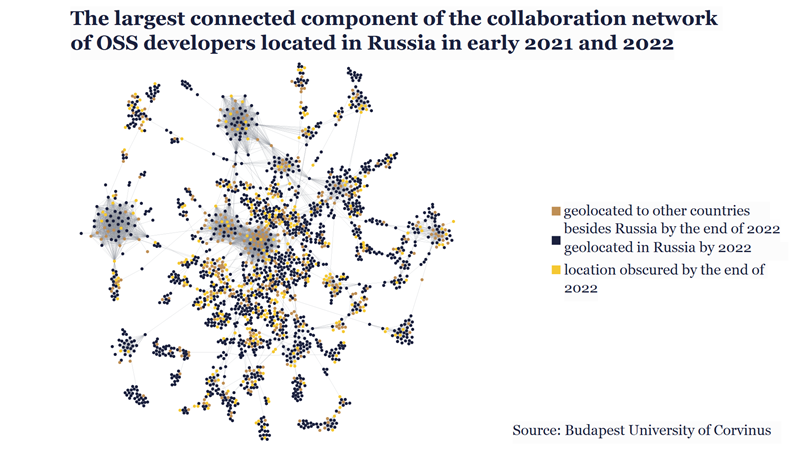Russian IT sector may face dark future
2023-06-26 09:59:00Since the outbreak of the war, there has been an exodus of young, highly skilled workers from Russia and Belarus. Experts warn that this could soon lead to a situation similar to that in post-World War II Germany in terms of skilled human capital in the two countries. Using data available on the online platform GitHub, a Corvinus researcher has studied the proportion of Russian and Belarusian software developers who have left their home countries since the Russian invasion of Ukraine.
_20230626075958_0.jpg)
While we have relatively accurate data on the Ukrainian population fleeing their homeland because of the war, we know much less about the mass of highly educated emigrants from Russia and its ally Belarus. They left their countries mainly because of economic sanctions, fear of conscription and moral opposition to the war. For instance, despite the Russian state’s tax cuts and other incentives to encourage them to stay, local labour authorities estimate that 10% of IT professionals had emigrated from Russia by the end of last year. However, according to researcher Johannes Wachs, associate professor at Corvinus University, the proportion may be much higher.
The short- and long-term effects of highly skilled emigration on the economy of the home and receiving countries are well documented in the relevant literature. Brain drain has an almost immediate negative impact in the home country: there is a shortage of certain professionals, which has a negative impact on the development of the whole industry and, indirectly, on other sectors. In addition, as a secondary effect, it significantly increases the wage costs of skilled workers staying at home. The receiving economy, on the other hand, usually benefits considerably from highly skilled foreign labour. In a paper published in the journal EPJ Data Science in EPJ Science, Corvinus researcher Johannes Wachs draws parallels with the situation in post-World War II Germany, where the lack of intellectuals who died or emigrated en masse as a result of the war set back the development of the German economy by decades: “human capital always takes much longer and is more difficult and costly to replace than the destroyed physical infrastructure,” he adds.
In order to get a more accurate picture of the extent of emigration of highly skilled Russian and Belarusian software developers in one of the sectors that are key to the competitiveness of modern states, the IT industry, the Corvinus researcher analysed data available on the GitHub online platform. He actually compared the data on the geolocation of Russian and Belarusian software developers on GitHub in February 2021 with their data in November 2022.

Like other post-Soviet countries, Russia has a strong tradition of technical and engineering education. 7.1% of Russia’s annual gross exports are linked to the information and communication technologies. With a particularly high representation of young men among software developers, who were rightly afraid of being conscripted into the army, their emigration started just a few months after the invasion of Ukraine. Johannes Wachs has analysed data primarily on software developers in Russia, Belarus, Ukraine and neighbouring countries, based on the profile pages of roughly 45 000 developers.
The data analysed by the researcher show that by November 22, 11% and 16% of developers had certainly left Russia and Belarus, respectively. These developers now indicate they live elsewhere. Another significant group of developers previously living in Russia and Belarus have obscured their locations. When considering those developers as potential emigrants too, Wachs estimates that as many as 28% of active Russian software developers and 30% of their Belarusian counterparts may have left in total. The share of software developers who emigrated from neighbouring countries not affected by the war was only 8% during the same period.
“These data show that since the start of the war somewhere between 1 in 10 and 1 in 3 developers have left Russia and Belarus. Confirmed leavers were much more prolific, too. This will have a very serious impact on the Russian IT sector and indirectly on the country’s economy in the short and longer term. It is interesting to note, however, that Ukraine has not seem a similar migration by its developers. One explanation for this may be the blocks on young men leaving the country, and a high motivation to stay on contribute to the defence of the country.” – explains the researcher.
Another interesting question is which states will benefit in the short term from the skills of the Russian and Belarusian IT professionals who are leaving their countries in droves. According to the new locations indicated by the software developers, most Russian software developers have moved to the United States, Germany and nearby states like Georgia and Armenia. In contrast to Russian developers, the vast majority of Belarusian software developers only went as far as neighbouring countries: 53% of those who emigrated started a new life in Poland, Lithuania, Ukraine or Latvia.
The full text of Johannes Wachs’ paper on the brain drain affecting the Russian and Belarusian IT industries published in EPJ Data Science is available HERE.